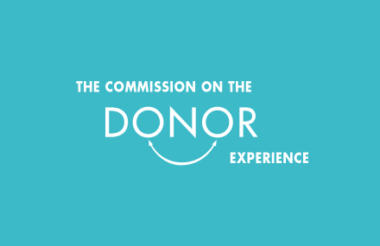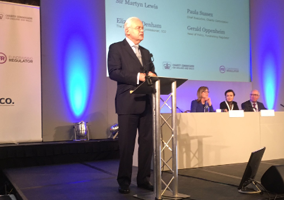The Commission on the Donor Experience is a massive piece of work, containing hundreds of pages of charitable wisdom. But a great deal of common ground exists between all reports. Some key messages come up again and again, which arguably can form the backbone of a simple set of principles for all fundraisers.
We picked out some key lessons from CDE contributors, in their own words.
Give the donor what they want
“Keep it simple, so discover what is most important to your donors and focus on that. There is no substitute for knowing why donors give and what they need or want from you. Understand that making donors feel good about supporting you is good for them and good for you.”
Retention is better than acquisition
“When done well, the supporter journey can cement a lifetime of support and will yield financial rewards; however, if done badly, it can damage relationships before they are even established and result in low commitment and loyalty, which will impact on future levels of giving.”
Build relationships
“A positive donor experience is not about what the donor can do for our charities, but what our charities can do for them. This isn't saying we should replace our charity's goals with those of the donor. Rather, we should be more aware of our donor's motivations and interests and work to find our common goals. What do they want to achieve, and what can we achieve together?”
Make an emotional connection (and mean it)
“People do not necessarily give where the need is highest, but they give instead where they have an emotional connection. It is stories and their emotional content that activate the predisposition to donate, not creative messages, statistics, the brand, or the logo.”
Say thank you
“The importance of finding better ways of saying thank you and of welcoming a new supporter to your charity simply must not be underestimated. At the most level, being thanked imaginatively, promptly and with integrity is the very least a donor should expect from you, given that this is the only thing they receive in return for making a donation.”
Understand your charity
“Programmes and service delivery teams are your gateway to gathering emotional and engaging stories that are crucial for your supporter journey. Have a plan to inspire and engage the rest of the organisation in what you are doing and why. When programme staff are aware that they share values and passions with donors who wish to achieve the same vision, stories can emerge that can connect donors more closely to beneficiaries.”
Engage the rest of your charity
“There should be a change in the culture of the charity to one that is focused on the donor experience; this must be led by trustees. Putting the donor at the heart of the charity is the responsibility of all members of the SMT and their staff, not just the fundraising director and fundraisers.”
Delegate, support and monitor
“Businesses we employ to work on our behalf are often the public faces of our organisations. It is common for suppliers to engage more with the public and donors than many charities themselves. We must invest time and resources in these relationships to ensure that they succeed.”
Help your supporters fundraise for you
“We trust the recommendations of people like us. Peer recommendations count and the best ask comes from someone we know and trust who shares our beliefs. Your reputation is what other people say about you. An increase in your reputation will lead to more inbound leads and opportunities.”
Research
“Make opportunities to speak to your donors. Finding out about them and their concerns, and listening to their views and concerns, gives you the best guidance on how to create communications that will be welcome.”
Test effectiveness
“Be a supporter. Go online and hit 'donate now'. Keep a record of what happens and when, and compare it not only to your own processes but also to your own expectations of good service. If anything fails to match up, change it.”
Measure
“Chasing short-term responses incentivises the fundraiser to create pressure, annoyance and dissatisfaction. Therefore, chasing short-term money risks damaging the way the donor feels about the charity and therefore jeopardises long-term income.
“To break the cycle of prioritising short-term response over building long-term loyalty requires a commitment and investment of time and/or money. If you want to achieve something, you have to measure it. Therefore, we have to find ways to measure how people feel.”
Invite feedback
“Most charity communications are one-way, talking at or to supporters, with no space or invitation for a response beyond a donation. How can a charity really know what works for its supporters without explicitly and regularly inviting supporters to communicate with the charity?”
Plan for the long term
“An obsession with short-term financial KPIs is the single biggest reason that donors are dissatisfied with the way charities fundraise. It forces us to follow ever more aggressive strategies in order to achieve the target amount of income or new donors.
“It also means that we never understand the impact of our communications in terms of how we make donors feel about us, or how emotionally engaged they are with us.”
Commit the necessary resources
“Charities have a better long-term return if they think of fundraising expenditure not as a cost, but as an investment that secures longer-term income, the charity's sustainability and ability to better deliver its mission, and its longer-term relationship with supporters through a better experience.
Prioritise the most effective things and do them first
“Keep it simple, so discover what is most important to your donors and focus on that. There is no substitute for knowing why donors give and what they need or want from you.”
Invest in recruitment and training
“Have a bit of a spring clean. What is your mind-set when looking for fundraisers? Are you describing the job in a way that attracts the people you want? Have a look at your induction programmes and on-going learning and development plans.”
Invest in technology
“Review new technologies and hardware/software as it is released. Ask - can this add to the supporter experience? Don't be seduced by new things. Think always - how can this improve the supporter experience. If you can't answer this - don't do it.
“Consider if your hardware and back end setup enable an enhanced supporter experience? Are your systems integrated so that data flows allow a single supporter view?”
Be clear and open
“Rethink language to reflect, respect and engage with the views and feelings of supporters. Talk less about the charity and more about the cause, the work, the beneficiaries and the supporters. Too often, the charity itself takes centre stage, dominating too many sentences through too much talk about 'us' and what 'we' do or have done.”
Bring the truth to life
“We should aim to produce communications that leave supporters feeling satisfied as well as inspired. That doesn't mean making them happy, or telling them how great they are. It means making them feel they have been told the truth, well, and entered into a clear and fair exchange with the charity.”
Tell stories and use numbers
“It is vital that charities are able and willing to explain their costs of fundraising. Not all donors will be interested in this information, but for those who are interested, it is important that individual charities explain their own approach.”
Explain your impact
“People claim they would like to hear about who the charity helps, the overall impact of donations and how the charity helps. This chimes with experimental research that suggests simple human examples are the most effective, although it may be worth backing them up with the bigger picture.”
Do not take advantage of vulnerable people
“Every organisation, charity and agency that has come under criticism in recent times for failing donors has had a policy on vulnerability. What has not been apparent is how that runs through the organisation.”
Have high moral values
"Charities must be ready to defend their actions when questioned. If a charity's trustees and chief executive are not willing to defend a charity's practice in public, if called upon, the charity should question whether it is something their organisation should continue."
Cherish your reputation
“Be the business area with the highest standards, which always does the right thing not just by its donors and beneficiaries but also by its staff, volunteers and by all its publics. The fundraising sector must lead the way in ethical business practices. It must see its role is in making donors both happy and reassured.”
Editor's note: One of our staff, David Ainsworth, was a contributor to the Commission on the Donor Experience.
Related articles











